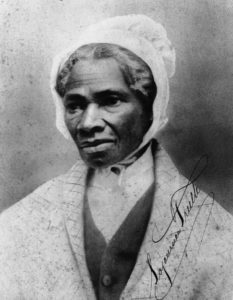Lecture Date: January 21, 2021
The sPower Lecture

Sojourner Truth began life in 1797 as a slave named Isabella in Ulster County, New York. After years of hard work and abuse, she ended her enslavement in late 1826. She then re-invented herself. The strikingly intelligent but illiterate young woman became an uncompromising abolitionist, a famed and witty speaker, a proponent of women’s rights, and an inspiring preacher. By the 1850s her Narrative of Sojourner Truth (1850) and Bible-inspired lectures made her name a familiar one throughout the northern states and in the nation’s newspapers. During her life, she used hard work, the speaker’s podium, the courts, and song as she fought against slavery and racial inequality and advocated for rights of women black and white. She won a legal action that freed her son, recruited black troops for the Union army, campaigned for temperance, and met with presidents. After the Civil War, she helped settle freed slaves, and even into her eighties, she worked to aid the migrant Exodusters in the 1870s. She died in 1883 in Battle Creek, Michigan, which honors her today with a massive statue that befits the six-foot-tall traveler for truth.
Speaker: Claudine Ferrell

Born in San Antonio, Claudine Ferrell received her B.A. in English and M.A. in history from Southwest Texas State College/University, the alma mater of Lyndon Johnson and now Texas State University. She taught U.S. and Texas history at Lamar University in Beaumont for three years before tackling the doctoral program at Rice University where she focused on American legal and constitutional history and African American history. Her dissertation was on the unsuccessful effort to pass a federal law against lynching in 1917-1922. A year at Kansas State University was followed by her coming to Fredericksburg and Mary Washington College. At UMW she teaches legal/constitutional and African American history, as well as courses on the Gilded Age, Progressive Era, the U.S. and Vietnam, the U.S. since 1945, America’s small wars, the American home front during the world wars, and American disasters—in addition to the history department’s two-course methods sequence for majors. She is currently chair of the Department of History and American Studies.